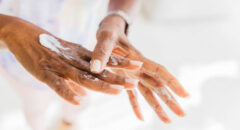
It’s estimated that there are over a million burn injuries in the United States annually. While many of these need medical intervention, some burns are minor and can be effectively treated at home. The key to treating burns successfully is acting as quickly as possible.
10 Home Remedies For Minor Burns
1. Cool Water
The first step in treating a minor burn is cooling the skin to soothe the injury and prevent further damage. You can do this by holding the affected area under cool, running water for at least 20 minutes. If the burning sensation or pain doesn’t lessen after using cool water, it may be a sign that you’re not dealing with a minor burn.
2. A Homemade Cool Compress
After using cool water to cool down the burn, a wet towel can be used as a cool compress to help soothe the area. You should apply the compress in five to 15-minute intervals to reduce pain and swelling. It’s important to note that you should never use ice or a cold pack as these can irritate the skin and cause more damage. Once the burn is cooled, you can move on to other treatments.
3. Aloe Vera
Aloe vera gel is known for its anti-inflammatory and antibacterial properties. It can also increase circulation. These factors make the plant ideal for treating burnt skin as it can reduce swelling while encouraging healing. To use this, apply aloe vera gel liberally to the affected area.
4. Honey
Honey is another item that has noteworthy anti-inflammatory and antibacterial properties. Applying it directly to a minor burn should help to soothe the skin and promote healing.
RELATED: Holiday Kitchen Accident? Here’s How to Treat Minor Cuts, Burns
5. Calendula
This plant is a member of the sunflower family and is often used in skin-soothing ointments and salves. Recently, a study suggested that using calendula extract directly on a minor burn can help to heal it.
6. Coconut Oil
Many skincare experts suggest that coconut oil is good for promoting the regeneration of skin cells. This property would help replace damaged skin cells in a minor burn. It also has anti-inflammatory and antioxidant properties that can help to reduce swelling while cutting down the likelihood of scarring.
7. Vitamin E Oil
Vitamin E oil is regularly recommended for maintaining healthy skin. That’s because it has anti-inflammatory and antioxidant properties. If you use this on a minor burn, it can help to heal the damaged skin.
8. Lavender Oil
For many years, lavender oil has been used on the skin to prevent infections, reduce swelling, prevent scarring, and








